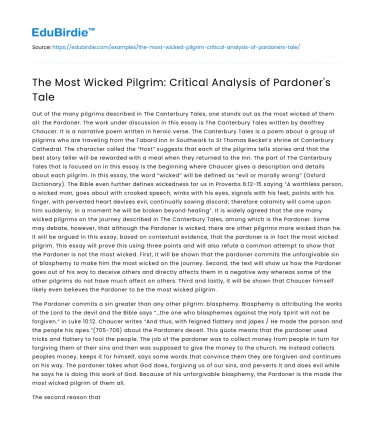Out of the many pilgrims described in The Canterbury Tales, one stands out as the most wicked of them all: the Pardoner. The work under discussion in this essay is The Canterbury Tales written by Geoffrey Chaucer. It is a narrative poem written in heroic verse. The Canterbury Tales is a poem about a group of pilgrims who are traveling from the Tabard Inn in Southwark to St Thomas Becket’s shrine at Canterbury Cathedral. The character called the “Host” suggests that each of the pilgrims tells stories and that the best story teller will be rewarded with a meal when they returned to the Inn. The part of The Canterbury Tales that is focused on in this essay is the beginning where Chaucer gives a description and details about each pilgrim. In this essay, the word “wicked” will be defined as “evil or morally wrong” (Oxford Dictionary). The Bible even further defines wickedness for us in Proverbs 6:12-15 saying “A worthless person, a wicked man, goes about with crooked speech, winks with his eyes, signals with his feet, points with his finger, with perverted heart devises evil, continually sowing discord; therefore calamity will come upon him suddenly; in a moment he will be broken beyond healing”. It is widely agreed that the are many wicked pilgrims on the journey described in The Canterbury Tales, among which is the Pardoner. Some may debate, however, that although the Pardoner is wicked, there are other pilgrims more wicked than he. It will be argued in this essay, based on contextual evidence, that the pardoner is in fact the most wicked pilgrim. This essay will prove this using three points and will also refute a common attempt to show that the Pardoner is not the most wicked. First, it will be shown that the pardoner commits the unforgivable sin of blasphemy to make him the most wicked on the journey. Second, the text will show us how the Pardoner goes out of his way to deceive others and directly affects them in a negative way whereas some of the other pilgrims do not have much affect on others. Third and lastly, it will be shown that Chaucer himself likely even believes the Pardoner to be the most wicked pilgrim.
The Pardoner commits a sin greater than any other pilgrim: blasphemy. Blasphemy is attributing the works of the Lord to the devil and the Bible says “…the one who blasphemes against the Holy Spirit will not be forgiven.” in Luke 10:12. Chaucer writes “And thus, with feigned flattery and japes / He made the parson and the people his apes.”(705-706) about the Pardoners deceit. This quote means that the pardoner used tricks and flattery to fool the people. The job of the pardoner was to collect money from people in turn for forgiving them of their sins and then was supposed to give the money to the church. He instead collects peoples money, keeps it for himself, says some words that convince them they are forgiven and continues on his way. The pardoner takes what God does, forgiving us of our sins, and perverts it and does evil while he says he is doing this work of God. Because of his unforgivable blasphemy, the Pardoner is the made the most wicked pilgrim of them all.
Save your time!
We can take care of your essay
- Proper editing and formatting
- Free revision, title page, and bibliography
- Flexible prices and money-back guarantee
The second reason that the Pardoner is the most wicked pilgrim is that he doesn’t just do evil, but goes out of his way to do it and affects others possible eternal souls by his sins as well. Chaucer writes;
“Well could he read a lesson and a story.
But alderbest he sang an offertory
For well he wiste when that song was sung
He muste preach and well afile his tongue
To winne silver he full well could.
Therefore he sang the merrily and loud.”(709-714).
This section of text is about the way the pardoner would use his voice to lure people in and get them to give money to supposedly have their sins pardoned.






 Stuck on your essay?
Stuck on your essay?

